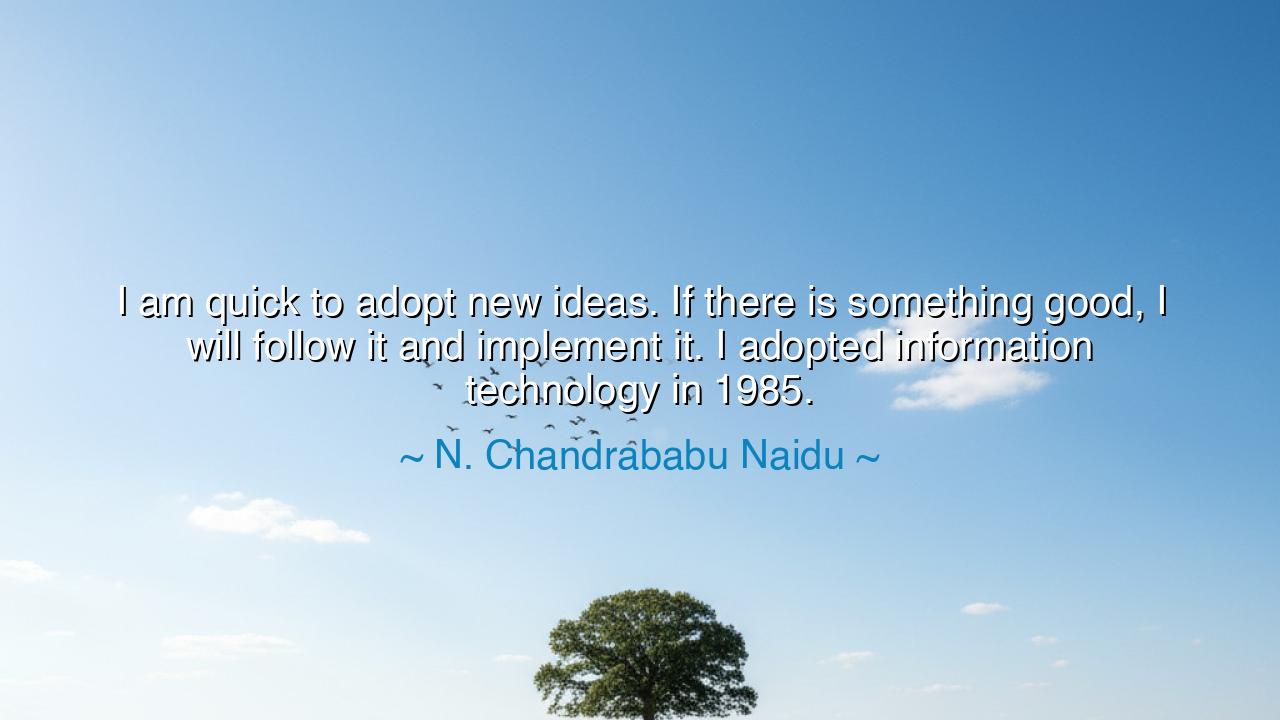
I am quick to adopt new ideas. If there is something good, I
I am quick to adopt new ideas. If there is something good, I will follow it and implement it. I adopted information technology in 1985.






N. Chandrababu Naidu, the visionary statesman of India, once declared: “I am quick to adopt new ideas. If there is something good, I will follow it and implement it. I adopted information technology in 1985.” Though these words are spoken in the context of politics and governance, they resound with a universal truth about the destiny of humankind: that progress belongs not to the hesitant, nor to the fearful, but to those who embrace change with courage and discernment.
The ancients knew well that civilizations rise and fall upon their openness to new ideas. The Egyptians embraced the wheel from their neighbors and built empires of stone; the Greeks, learning from the Babylonians, charted the stars and mapped the heavens; the Romans adopted the knowledge of conquered lands, weaving them into roads, laws, and aqueducts that endured for centuries. To resist the good that change brings is to close the gates of the city to the winds of destiny. But to open them wisely, as Naidu did with information technology, is to invite prosperity and transformation into the very heart of a people.
In his words, Naidu reveals not merely the act of adoption, but the spirit of discernment. For the wise do not chase every glittering novelty, but search for what is truly good—that which uplifts, empowers, and serves the many. In 1985, long before computers and the internet reshaped the daily life of billions, Naidu foresaw that information technology would be the new lifeblood of governance, commerce, and learning. Where others saw strange machines and uncertain codes, he saw a future where data would guide decisions, where efficiency would replace stagnation, and where his people could stand at the forefront of a digital age.
History gives us another story of such vision: the tale of Peter the Great of Russia. In an age when his nation remained cloistered in old traditions, Peter traveled to the West, learning the ways of shipbuilding, science, and administration. Upon his return, he implemented these new ideas, reshaping his nation and transforming it into a power that could stand among the giants of Europe. His greatness lay not only in conquest, but in his humility to learn, to adopt, and to adapt. So too did Naidu, though not on the battlefield of steel, but on the battlefield of knowledge and technology.
From these examples, we see that the power to embrace new ideas is more than a skill—it is a form of courage. It is the courage to admit that the old ways, though comfortable, may not serve the future. It is the willingness to risk mockery, failure, or doubt, in order to prepare a path that others cannot yet see. Naidu’s early embrace of information technology carved a place for his people in the great unfolding of the modern world, just as countless innovators and leaders before him secured the future by daring to step into the unknown.
The lesson for us is profound. In our own lives, opportunities for new ideas come daily—through books, through encounters, through the quiet voice of intuition. Many dismiss them, clinging to the safe and the familiar. But if we are to grow, we must train our hearts to be like Naidu’s: quick to recognize the good, eager to implement it, and steadfast in carrying it forward even when others hesitate. For it is not the idea alone that changes the world, but the courage to embody it in action.
Therefore, O children of the future, let these words be your guide. Do not fear change, but study it; do not worship novelty, but discern it; do not delay when you find what is good, but seize it with both hands and implement it with all your strength. For in every age, it is the bold adopters, the visionaries who embrace new ideas with patience and purpose, who become the architects of destiny. And perhaps, in your own day, you too shall speak as Naidu spoke: “I saw the future, I welcomed it, and it became the path for my people.”






AAdministratorAdministrator
Welcome, honored guests. Please leave a comment, we will respond soon